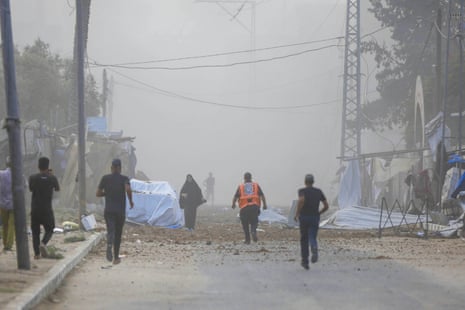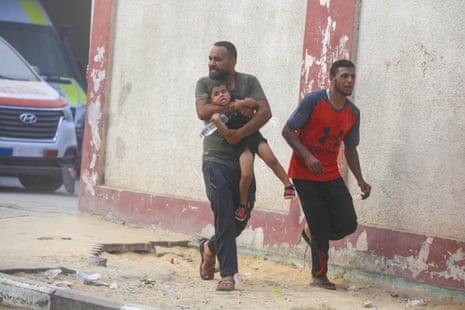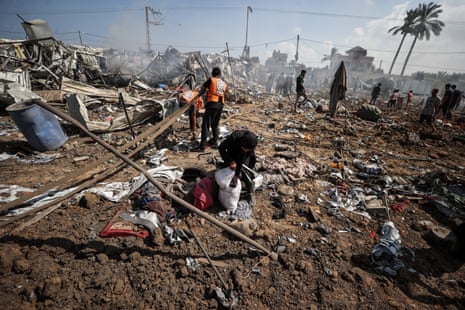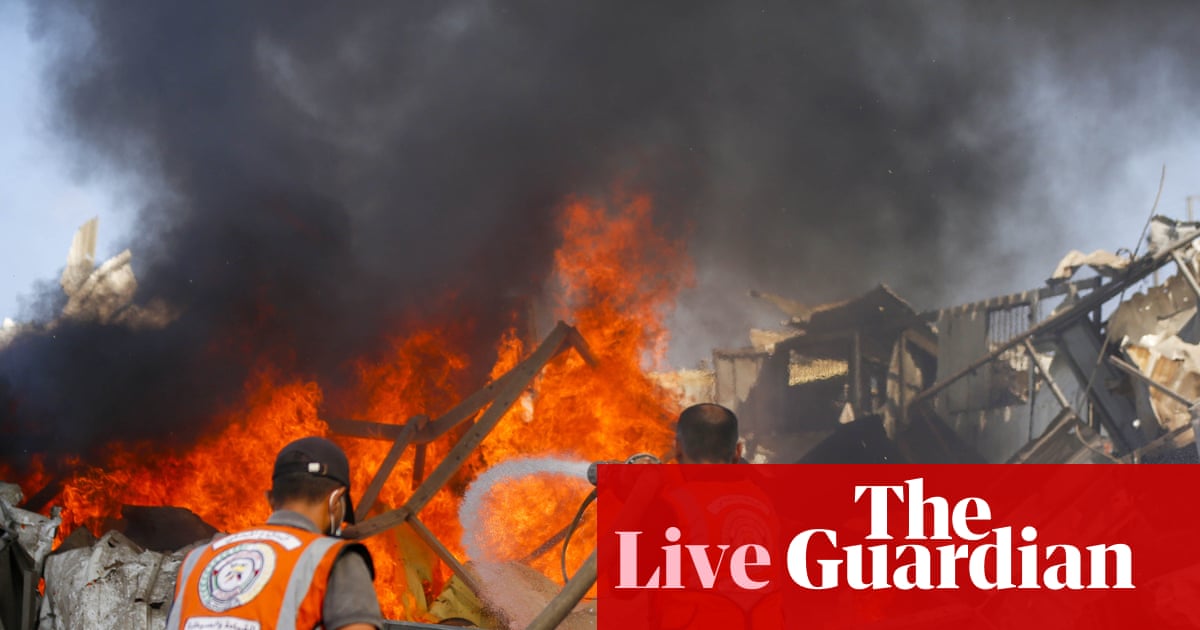Israel keeps up military pressure on Gaza City ahead of planned offensive

Peter Beaumont
Has Israel begun its offensive to conquer Gaza City or is it hype? Following several weeks of threats of a new large-scale offensive, strongly opposed by the majority of the international community, Israeli officials have daily made announcements saying the plan to conquer Gaza City has been “approved”. It has been approved by the IDF, by the security cabinet, by defence minister Israel Katz. Later today, in an event with the Israeli military, prime minister Benjamin Netanyahu will proffer his “approval”. How many times, one is tempted to ask, does one plan need approving?
As so often in dealing with Israeli officials, and Netanyahu in particular, filtering out what is true, what is lies, and what is calculated misdirection is a complicated business.
While Reuters reported a junior defence spokesman as suggesting that the operation to take Gaza City had begun, quotes from that briefing paint a more complex picture, including a reference to the second phase of Operation Gideon’s Chariots, the Israeli military offensive that began several months ago.

In reality, however, recent military activity in Gaza was depicted as being “preliminary” to any new offensive. For his part, Netanyahu’s office put out an opaque statement saying he had asked for planning timelines for the conquest of Gaza City to be accelerated.
Given the profound divisions within Israeli society, with some 400,000 demonstrating recently in favour of a ceasefire deal and release of the remaining 20 living hostages in Gaza, and continued contacts between mediators and both Israel and Hamas, unpacking the politics of what Netanyahu is up to is complex.
On the one hand, far right members of his coalition have threatened (once again) to walk away in the event of a ceasefire, demanding the conquest of all of Gaza and Jewish settlement of the coastal strip. On the other is the fact that ceasefire talks are continuing.

Earlier this week Hamas said it had accepted a ceasefire proposal that would see the release of some 10 living hostages in the first phase of the a 60 day pause, while senior Israeli officials (but not an official “delegation”) have met with mediators even as Netanyahu has dragged his feet over giving Israel’s reply, reportedly delaying a cabinet meeting where it would have been discussed.
All of which leaves big questions unanswered . While some Israeli and international analysts have speculated that the current moves on the ground amount to pressure on Hamas to improve any deal that might just be emerging, others – like Ronen Bergman, one of Israel’s most authoritative security analysts – suggest that Netanyahu would like to push on with fighting for years if possible, in order to delay his ongoing legal cases and ensure his continued political survival.
What most agree is that any new major campaign is likely to have serious consequences. For Israelis, including senior figures in the defence establishment, one concern is whether living hostages would survive, an issue motivating the mass demonstrations.

Others point out that to all intents and purposes the deal Hamas has agreed to is one Israel signalled its agreement for only weeks ago. Any offensive would be seen by the international community for what it is, the most cynical of moves leading to an even deeper humanitarian catastrophe – if that can even be imagined.
Without much military utility, and diplomatically self harming, the suspicion then must be that much of this – for now at least – is deliberately performative, though even veteran Israeli analysts are puzzled to what end. To buy time for Netanyahu to flip flop again about what he sees as the objectives of the war? In the hope that Egyptian pressure on Hamas will provide a deal that can be sold? Or perhaps Netanyahu, like a modern day Macbeth, can no longer see a way forward or a way back, “in blood stepped in so far that should I wade no more returning were as tedious as go o’er.”
Key events
Armed Palestinian groups in Lebanese refugee camps will start handing over their weapons to the authorities on Thursday, a joint committee said, following a deal reached in May.
“Today marks the beginning of the first phase of the process of handing over weapons from inside the Palestinian camps,” Lebanese-Palestinian Dialogue Committee chairman Ramez Dimashkieh said in a statement.
The process would begin with the Burj al-Barajneh camp in Beirut, where an initial batch of weapons would be delivered and placed in the custody of the Lebanese army, he added.
Later on Thursday, Israeli military spokesperson Avichay Adraee wrote on X that the military had started making what he said were initial warning calls to medical and international organisations operating in Gaza’s north, telling them that Gaza City residents should start to prepare to move out of the city and towards the south.
Adraee shared a recording of what he said was an Israeli officer telling a Gazan health ministry official that hospitals in southern Gaza should also prepare to receive patients from medical facilities in the north, who will be forced to evacuate.
Reuters couldn’t independently verify the authenticity of the call, although the Israeli military has in the past contacted officials and civilians in Gaza to warn them to relocate.
#عاجل
🔹 تسجيل لمكالمة بين ضابط منسقية أعمال الحكومة في غزة ومسؤول صحي رفيع في شمال القطاعجيش الدفاع الإسرائيلي بدأ بمكالمات تحذيرية أولية مع جهات طبية ومنظمات دولية في شمال قطاع #غزة
🔹 الهدف: الاستعداد لتحريك السكان من مدينة غزة جنوبًا لحمايتهم. pic.twitter.com/JCAwnJiikm
— افيخاي ادرعي (@AvichayAdraee) August 21, 2025
Turkish port authorities have begun informally requiring shipping agents to provide letters declaring that vessels are not linked to Israel and not carrying military or hazardous cargo bound for the country, according to two shipping sources.
The move is another step Turkey has taken against Israel after it last year severed trade with the country, worth $7bn (£5.20bn) annually, over its war in Gaza with Palestinian militant group Hamas.
The sources said the harbour master’s office had verbally instructed port agents to provide written assurances, adding that there was no official circular on the issue.
One of the sources said the instruction applied to ports across Turkey.
Christian Cardon, chief spokesman for the International Committee of the Red Cross (ICRC), told AFP: “The intensification of hostilities in Gaza means more killing, more displacement, more destruction and more panic.
“Gaza is a closed space, from which nobody can escape… and where access to health care, food and safe water is dwindling,” said Cardon.
“Meanwhile, the security of humanitarians is getting worse by the hour,” the spokesman added.
Read our analysis of whether Israel has begun its Gaza City offensive or will there be yet more ‘approvals’.
Despite daily announcements about its plan, Israel knows any major new campaign will have serious consequences.
Learn more here:
Britain imposed sanctions on one individual and four entities on Wednesday under its Iran sanctions regime, saying they are part of a network that supports Tehran’s overseas activities, including in Ukraine and Israel.
The sanctions include an asset freeze on Iranian oil magnate Hossein Shamkhani, and on four companies operating in the shipping, petrochemical and financial sectors, according to a government notice published online.
Britain said the network had facilitated hostile activity by the Iranian government, including efforts to destabilise the UK and other countries.
Some of the companies were cited for acting on behalf of or at the direction of Shamkhani, who is accused of aiding Iran’s overseas operations. Shamkhani was also sanctioned by the United States last month.
The sanctions freeze any UK-based assets and bar British individuals and businesses from dealing with the designated parties.
Further to comments made here, UNRWA’s commissioner-general Philippe Lazzarini has accused Israel of using “food as a weapon of war”, saying “it is a manufactured and fabricated famine.”
Relatives of Israelis held in Gaza say failure to agree ceasefire deal is a ‘death sentence’ for hostages
Relatives of Israeli hostages held in Gaza have urged Benjamin Netanyahu’s government to accept a proposed ceasefire deal saying a failure to do so is “a death sentence for the living hostages and a sentence of disappearance for the deceased ones.”
“History is repeating itself,” said Lishay Miran Lavi, wife of Omri Miran, who is thought to be alive. “There’s an agreement on the table that can save living hostages and bring deceased ones back for a proper burial. Hamas has agreed but the prime minister’s office is toiling to decree a death sentence for the living hostages and a sentence of disappearance for the deceased ones.”
Hamas agreed earlier this week to a 60-day ceasefire that would reportedly free 10 living hostages. Netanyahu has insisted on a comprehensive deal to end the war and has not convened his cabinet to discuss the 60-day truce.
Children suffering from malnutrition in Gaza could die if emergency provisions are not immediately put in place during Israel’s Gaza City military operation, the head of the UN Palestinian refugee agency has warned.
UNRWA commissioner-general Philippe Lazzarini said its data showed a six-fold increase in the number of children suffering from malnutrition in Gaza City since March.
“We have a population that is extremely weak that will be confronted with a new major military operation,” he said in comments reported by Reuters. “Many will simply not have the strength to undergo a new displacement.”
“If there is no crisis plan, then they will certainly be condemned,” he said.
Israeli citizen Saleh Abu-Hussein, who was detained in Lebanon for about a year, has returned to Israel following negotiations with the help of the Red Cross, the Israeli prime minister’s office has said.
The prime minister’s office did not disclose details on the circumstances of the citizen’s detention, according to Reuters.
Israel’s plans to expand the fighting and seize Gaza City have sparked international outcry as well as domestic opposition. The Red Cross became the latest voice to condemn the plan on Thursday, calling it “intolerable”.
The UN humanitarian agency has warned the Israeli plan to expand military operations in Gaza City would have “a horrific humanitarian impact” on the already exhausted population.
“Forcing hundreds of thousands to move south is a recipe for further disaster and could amount to forcible transfer,” OCHA said.
The UN Human Rights office in the Palestinian territories also voiced concern.
“Hundreds of families have been forced to flee, including many children, persons with disabilities, and older people, with nowhere safe to go,” it said.
Others reportedly “remain trapped, completely cut off from food, water and medicine supplies”, it added.
Israel keeps up military pressure on Gaza City ahead of planned offensive

Peter Beaumont
Has Israel begun its offensive to conquer Gaza City or is it hype? Following several weeks of threats of a new large-scale offensive, strongly opposed by the majority of the international community, Israeli officials have daily made announcements saying the plan to conquer Gaza City has been “approved”. It has been approved by the IDF, by the security cabinet, by defence minister Israel Katz. Later today, in an event with the Israeli military, prime minister Benjamin Netanyahu will proffer his “approval”. How many times, one is tempted to ask, does one plan need approving?
As so often in dealing with Israeli officials, and Netanyahu in particular, filtering out what is true, what is lies, and what is calculated misdirection is a complicated business.
While Reuters reported a junior defence spokesman as suggesting that the operation to take Gaza City had begun, quotes from that briefing paint a more complex picture, including a reference to the second phase of Operation Gideon’s Chariots, the Israeli military offensive that began several months ago.
In reality, however, recent military activity in Gaza was depicted as being “preliminary” to any new offensive. For his part, Netanyahu’s office put out an opaque statement saying he had asked for planning timelines for the conquest of Gaza City to be accelerated.
Given the profound divisions within Israeli society, with some 400,000 demonstrating recently in favour of a ceasefire deal and release of the remaining 20 living hostages in Gaza, and continued contacts between mediators and both Israel and Hamas, unpacking the politics of what Netanyahu is up to is complex.
On the one hand, far right members of his coalition have threatened (once again) to walk away in the event of a ceasefire, demanding the conquest of all of Gaza and Jewish settlement of the coastal strip. On the other is the fact that ceasefire talks are continuing.
Earlier this week Hamas said it had accepted a ceasefire proposal that would see the release of some 10 living hostages in the first phase of the a 60 day pause, while senior Israeli officials (but not an official “delegation”) have met with mediators even as Netanyahu has dragged his feet over giving Israel’s reply, reportedly delaying a cabinet meeting where it would have been discussed.
All of which leaves big questions unanswered . While some Israeli and international analysts have speculated that the current moves on the ground amount to pressure on Hamas to improve any deal that might just be emerging, others – like Ronen Bergman, one of Israel’s most authoritative security analysts – suggest that Netanyahu would like to push on with fighting for years if possible, in order to delay his ongoing legal cases and ensure his continued political survival.
What most agree is that any new major campaign is likely to have serious consequences. For Israelis, including senior figures in the defence establishment, one concern is whether living hostages would survive, an issue motivating the mass demonstrations.
Others point out that to all intents and purposes the deal Hamas has agreed to is one Israel signalled its agreement for only weeks ago. Any offensive would be seen by the international community for what it is, the most cynical of moves leading to an even deeper humanitarian catastrophe – if that can even be imagined.
Without much military utility, and diplomatically self harming, the suspicion then must be that much of this – for now at least – is deliberately performative, though even veteran Israeli analysts are puzzled to what end. To buy time for Netanyahu to flip flop again about what he sees as the objectives of the war? In the hope that Egyptian pressure on Hamas will provide a deal that can be sold? Or perhaps Netanyahu, like a modern day Macbeth, can no longer see a way forward or a way back, “in blood stepped in so far that should I wade no more returning were as tedious as go o’er.”
In Gaza City, thousands of Palestinians have left their homes as Israeli forces have escalated shelling on the Sabra and Tuffah neighbourhoods. Some families have left for shelters along the coast, while others have moved to central and southern parts of the enclave, according to residents there.
“We are facing a bitter-bitter situation, to die at home or leave and die somewhere else, as long as this war continues, survival is uncertain,” said Rabah Abu Elias, 67, a father of seven.
“In the news, they speak about a possible truce, on the ground, we only hear explosions and see deaths. To leave Gaza City or not isn’t an easy decision to make,” he told Reuters by phone.
Israeli tanks have been edging closer to densely populated Gaza City over the past ten days. Israeli officials have said evacuation notices would be issued to Palestinians there before the military moves in.
Two more people have died of starvation and malnutrition in Gaza in the past 24 hours, the territory’s health ministry said on Thursday. The new deaths raised the number of Palestinians who have died from such causes to 271, including 112 children, since the war began.
Source link
#Israel #military #pressure #Gaza #City #ahead #planned #offensive #Middle #East #crisis #live #Gaza
